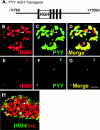Energy homeostasis and gastrointestinal endocrine differentiation do not require the anorectic hormone peptide YY
- PMID: 15870288
- PMCID: PMC1087718
- DOI: 10.1128/MCB.25.10.4189-4199.2005
Energy homeostasis and gastrointestinal endocrine differentiation do not require the anorectic hormone peptide YY
Abstract
The gastrointestinal hormone peptide YY is a potent inhibitor of food intake and is expressed early during differentiation of intestinal and pancreatic endocrine cells. In order to better understand the role of peptide YY in energy homeostasis and development, we created mice with a targeted deletion of the peptide YY gene. All intestinal and pancreatic endocrine cells developed normally in the absence of peptide YY with the exception of pancreatic polypeptide (PP) cells, indicating that peptide YY expression was not required for terminal differentiation. We used recombination-based cell lineage trace to determine if peptide YY cells were progenitors for gastrointestinal endocrine cells. Peptide YY(+) cells gave rise to all L-type enteroendocrine cells and to islet partial differential and PP cells. In the pancreas, approximately 40% of pancreatic alpha and rare beta cells arose from peptide YY(+) cells, suggesting that most beta cells and surprisingly the majority of alpha cells are not descendants of peptide YY(+)/glucagon-positive/insulin-positive cells that appear during early pancreagenesis. Despite the anorectic effects of exogenous peptide YY(3-36) following intraperitoneal administration, mice lacking peptide YY showed normal growth, food intake, energy expenditure, and responsiveness to peptide YY(3-36). These observations suggest that targeted disruption of the peptide YY gene does not perturb terminal endocrine cell differentiation or the control of food intake and energy homeostasis.
Figures








References
-
- Adams, S. H., W. B. Won, S. E. Schonhoff, A. B. Leiter, and J. R. Paterniti, Jr. 2004. Effects of peptide YY[3-36] on short-term food intake in mice are not affected by prevailing plasma ghrelin levels. Endocrinology 145:4967-4975. - PubMed
-
- Asakawa, A., A. Inui, N. Ueno, M. Fujimiya, M. A. Fujino, and M. Kasuga. 1999. Mouse pancreatic polypeptide modulates food intake, while not influencing anxiety in mice. Peptides 20:1445-1448. - PubMed
-
- Batterham, R. L., M. A. Cowley, C. J. Small, H. Herzog, M. A. Cohen, C. L. Dakin, A. M. Wren, A. E. Brynes, M. J. Low, M. A. Ghatei, R. D. Cone, and S. R. Bloom. 2002. Gut hormone PYY(3-36) physiologically inhibits food intake. Nature 418:650-654. - PubMed
-
- Batterham, R. L., C. W. Le Roux, M. A. Cohen, A. J. Park, S. M. Ellis, M. Patterson, G. S. Frost, M. A. Ghatei, and S. R. Bloom. 2003. Pancreatic polypeptide reduces appetite and food intake in humans. J. Clin. Endocrinol. Metab. 88:3989-3992. - PubMed
-
- Brouns, I., L. Van Nassauw, J. Van Genechten, M. Majewski, D. W. Scheuermann, J. P. Timmermans, and D. Adriaensen. 2002. Triple immunofluorescence staining with antibodies raised in the same species to study the complex innervation pattern of intrapulmonary chemoreceptors. J. Histochem. Cytochem. 50:575-582. - PubMed
Publication types
MeSH terms
Substances
Grants and funding
- P60 DK020593/DK/NIDDK NIH HHS/United States
- U19 DK042502/DK/NIDDK NIH HHS/United States
- P30 DK034928/DK/NIDDK NIH HHS/United States
- DK67166/DK/NIDDK NIH HHS/United States
- DK52870/DK/NIDDK NIH HHS/United States
- T32-CA65441/CA/NCI NIH HHS/United States
- P30 DK020593/DK/NIDDK NIH HHS/United States
- P30-DK34928/DK/NIDDK NIH HHS/United States
- DK43673/DK/NIDDK NIH HHS/United States
- T32 CA065441/CA/NCI NIH HHS/United States
- DK42502/DK/NIDDK NIH HHS/United States
- R01 DK067166/DK/NIDDK NIH HHS/United States
- DK20593/DK/NIDDK NIH HHS/United States
- P01 DK042502/DK/NIDDK NIH HHS/United States
- R01 DK043673/DK/NIDDK NIH HHS/United States
LinkOut - more resources
Full Text Sources
Other Literature Sources
Molecular Biology Databases
Research Materials
Miscellaneous
